【精品同步课件】北师大英语必修1:Unit 1 Lifestyles SectionⅣ Grammar & Writing
文档属性
| 名称 | 【精品同步课件】北师大英语必修1:Unit 1 Lifestyles SectionⅣ Grammar & Writing |
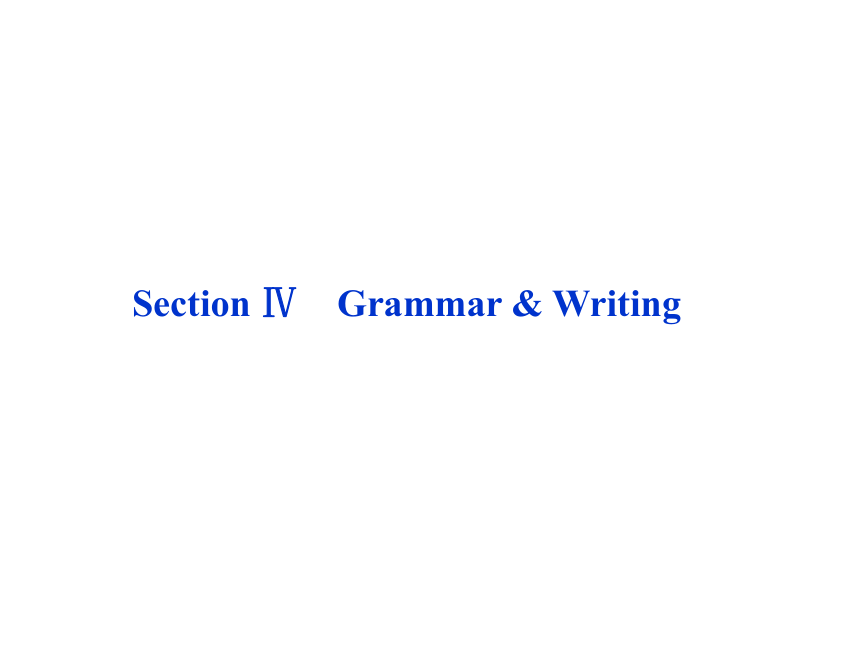
|
|
| 格式 | rar | ||
| 文件大小 | 551.7KB | ||
| 资源类型 | 教案 | ||
| 版本资源 | 北师大版 | ||
| 科目 | 英语 | ||
| 更新时间 | 2011-10-05 00:00:00 | ||
图片预览

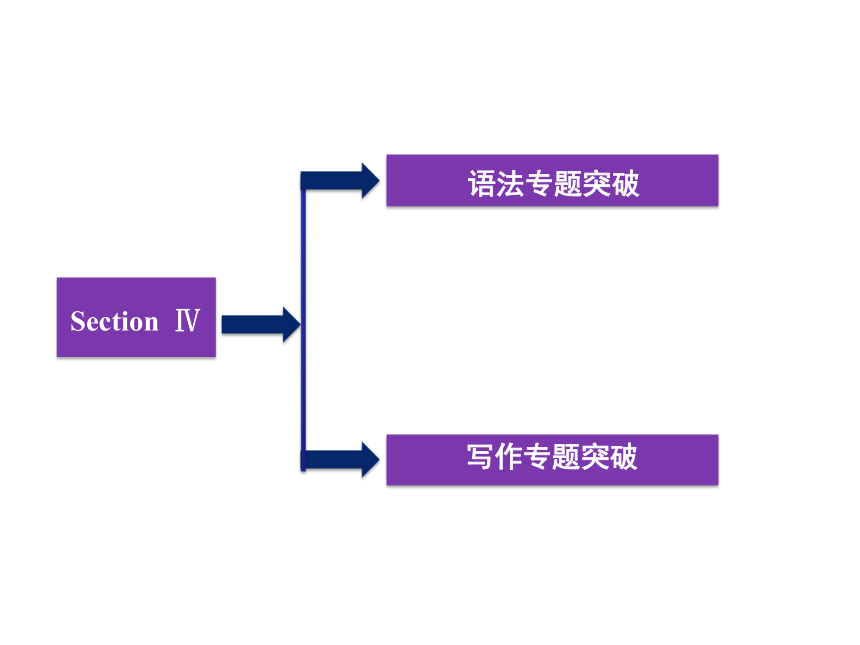
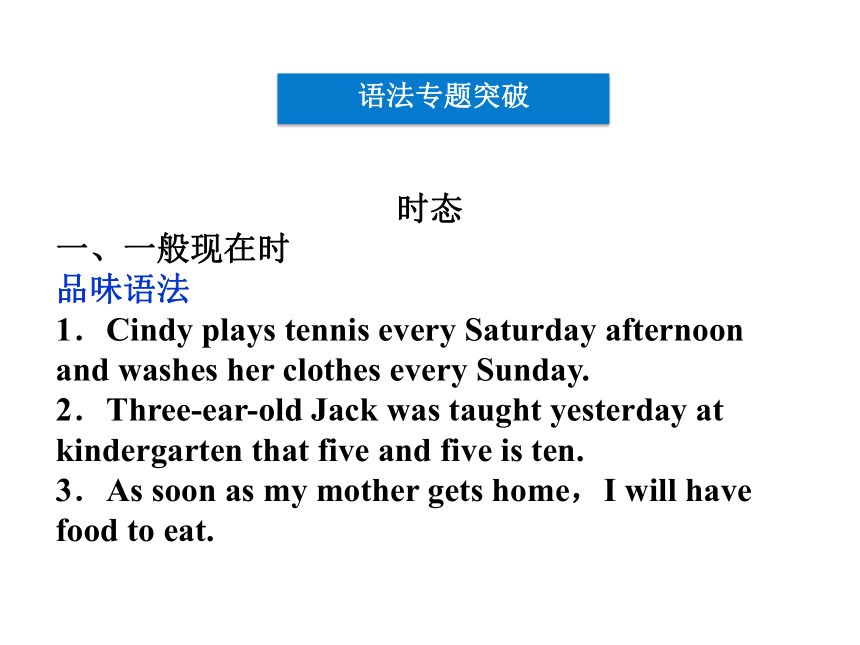
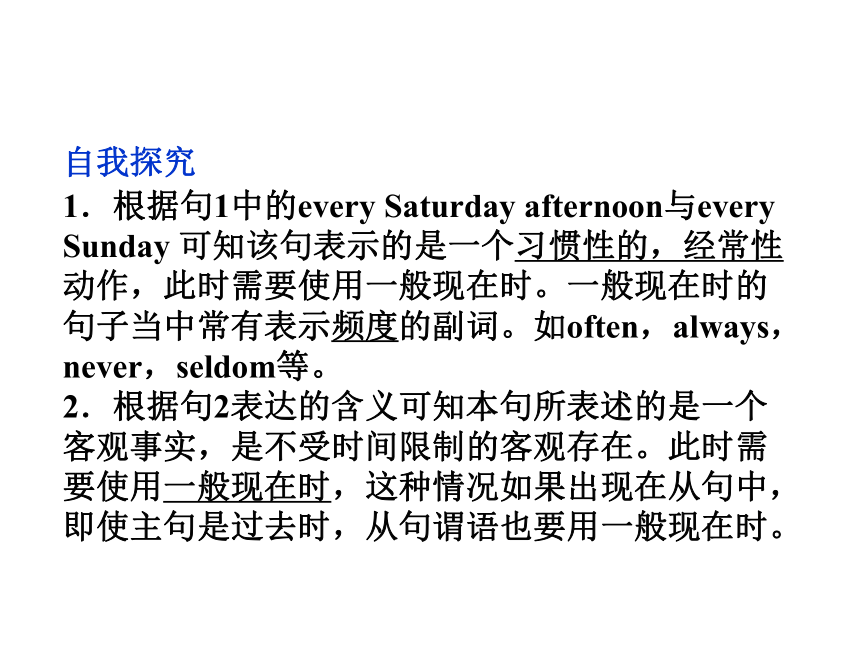
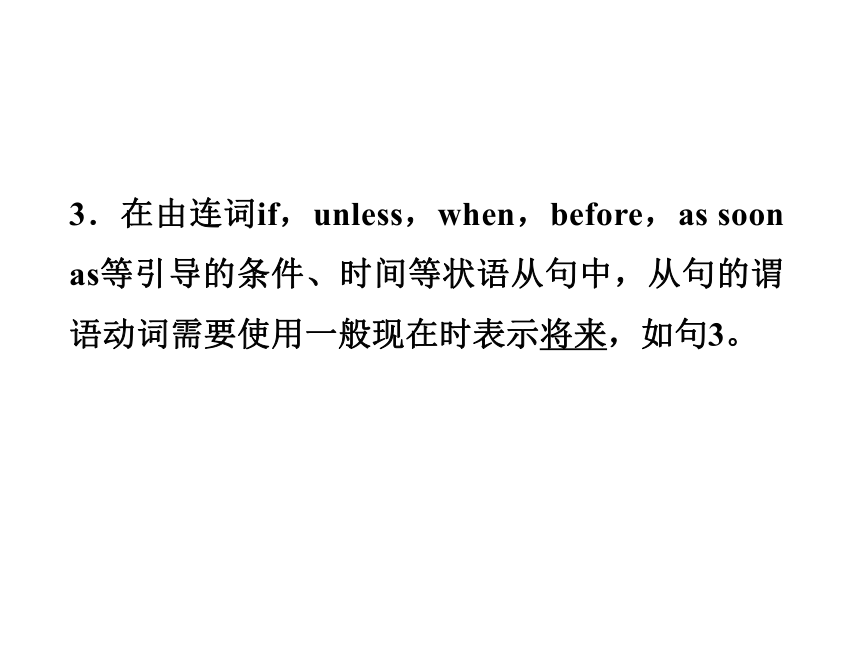
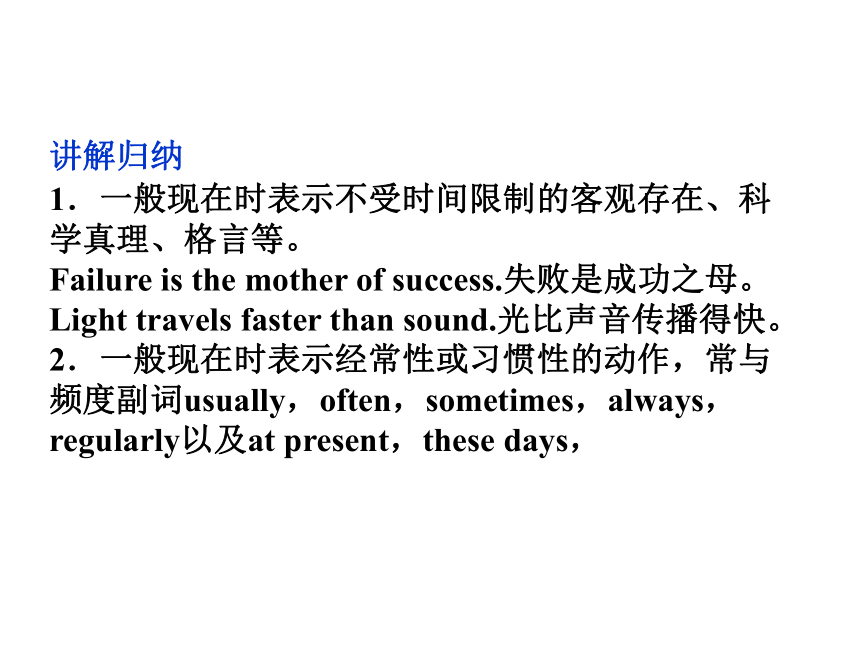
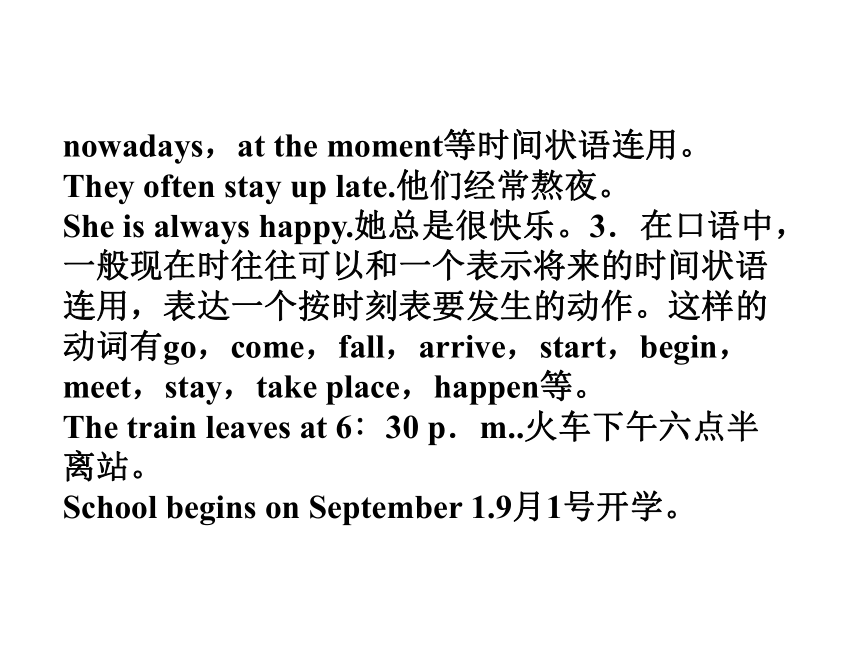
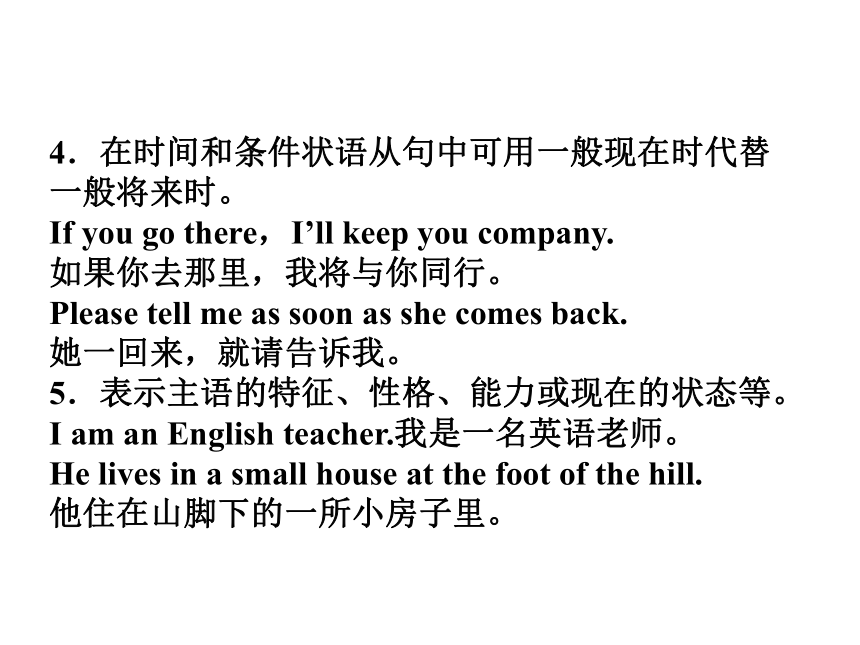
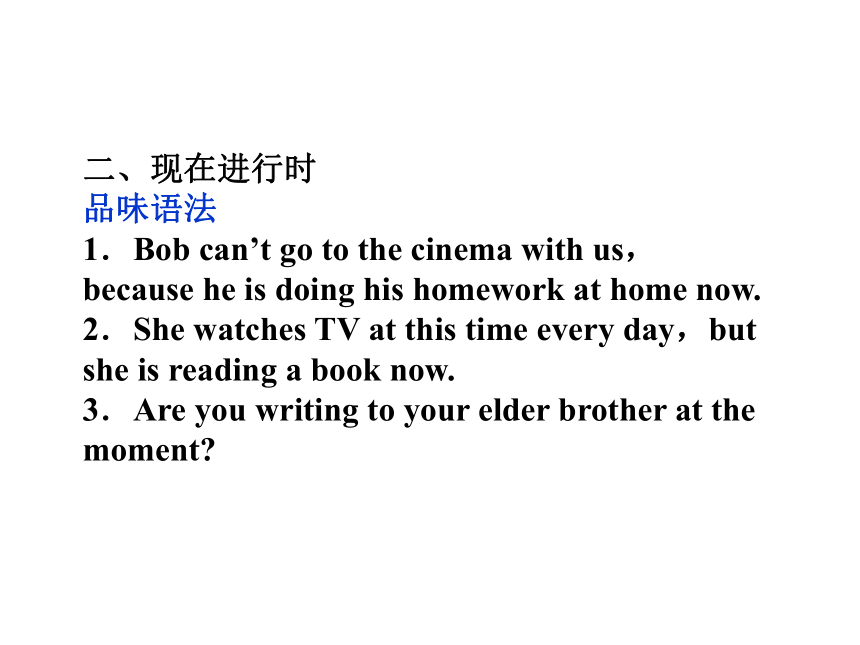
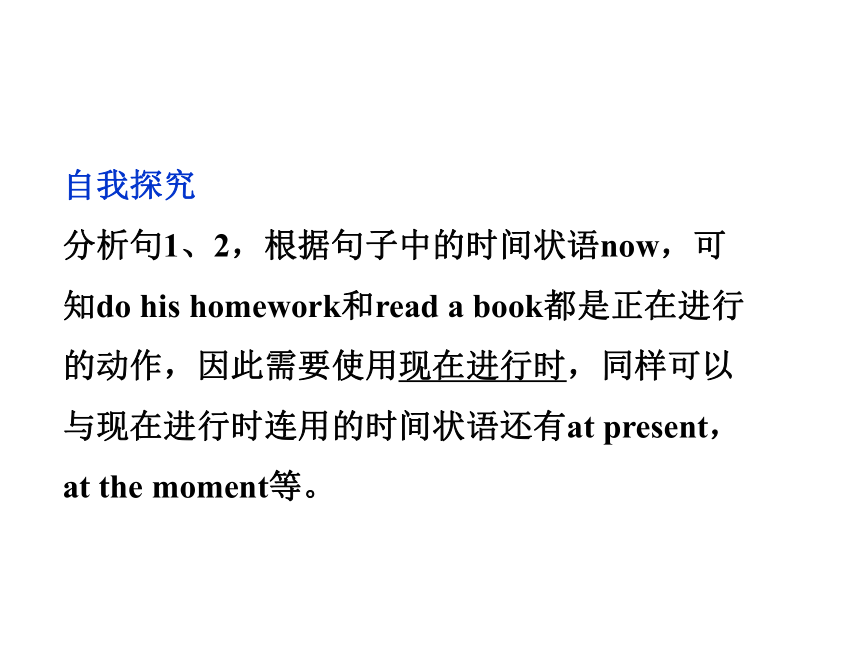
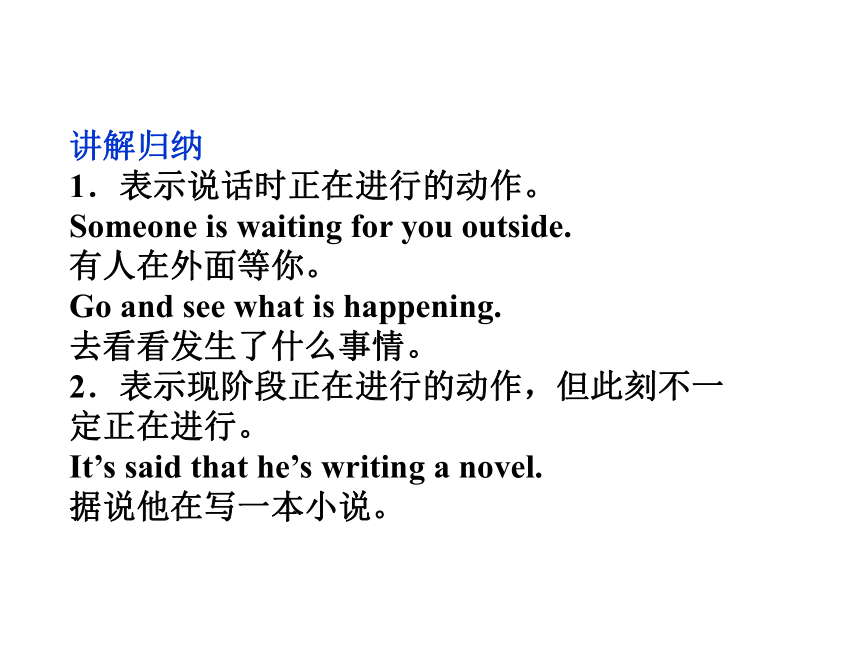
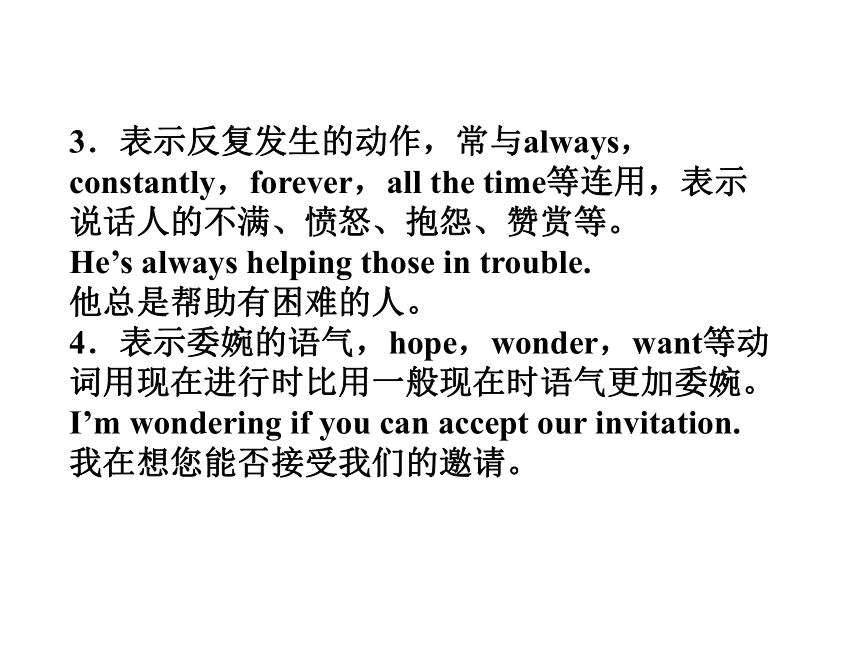
文档简介
(共45张PPT)
Section Ⅳ Grammar & Writing
写作专题突破
Unit 1
语法专题突破
Section Ⅳ
语法专题突破
时态
一、一般现在时
品味语法
1.Cindy plays tennis every Saturday afternoon and washes her clothes every Sunday.
2.Three-ear-old Jack was taught yesterday at kindergarten that five and five is ten.
3.As soon as my mother gets home,I will have food to eat.
自我探究
1.根据句1中的every Saturday afternoon与every Sunday 可知该句表示的是一个习惯性的,经常性动作,此时需要使用一般现在时。一般现在时的句子当中常有表示频度的副词。如often,always,never,seldom等。
2.根据句2表达的含义可知本句所表述的是一个客观事实,是不受时间限制的客观存在。此时需要使用一般现在时,这种情况如果出现在从句中,即使主句是过去时,从句谓语也要用一般现在时。
3.在由连词if,unless,when,before,as soon as等引导的条件、时间等状语从句中,从句的谓语动词需要使用一般现在时表示将来,如句3。
讲解归纳
1.一般现在时表示不受时间限制的客观存在、科学真理、格言等。
Failure is the mother of success.失败是成功之母。
Light travels faster than sound.光比声音传播得快。
2.一般现在时表示经常性或习惯性的动作,常与频度副词usually,often,sometimes,always,regularly以及at present,these days,
nowadays,at the moment等时间状语连用。
They often stay up late.他们经常熬夜。
She is always happy.她总是很快乐。3.在口语中,一般现在时往往可以和一个表示将来的时间状语连用,表达一个按时刻表要发生的动作。这样的动词有go,come,fall,arrive,start,begin,meet,stay,take place,happen等。
The train leaves at 6∶30 p.m..火车下午六点半离站。
School begins on September 1.9月1号开学。
4.在时间和条件状语从句中可用一般现在时代替一般将来时。
If you go there,I’ll keep you company.
如果你去那里,我将与你同行。
Please tell me as soon as she comes back.
她一回来,就请告诉我。
5.表示主语的特征、性格、能力或现在的状态等。
I am an English teacher.我是一名英语老师。
He lives in a small house at the foot of the hill.
他住在山脚下的一所小房子里。
二、现在进行时
品味语法
1.Bob can’t go to the cinema with us,because he is doing his homework at home now.
2.She watches TV at this time every day,but she is reading a book now.
3.Are you writing to your elder brother at the moment
自我探究
分析句1、2,根据句子中的时间状语now,可知do his homework和read a book都是正在进行的动作,因此需要使用现在进行时,同样可以与现在进行时连用的时间状语还有at present,at the moment等。
讲解归纳
1.表示说话时正在进行的动作。
Someone is waiting for you outside.
有人在外面等你。
Go and see what is happening.
去看看发生了什么事情。
2.表示现阶段正在进行的动作,但此刻不一定正在进行。
It’s said that he’s writing a novel.
据说他在写一本小说。
3.表示反复发生的动作,常与always,constantly,forever,all the time等连用,表示说话人的不满、愤怒、抱怨、赞赏等。
He’s always helping those in trouble.
他总是帮助有困难的人。
4.表示委婉的语气,hope,wonder,want等动词用现在进行时比用一般现在时语气更加委婉。
I’m wondering if you can accept our invitation.
我在想您能否接受我们的邀请。
5.现在进行时表将来,主要表示按计划或安排要发生的动作。Be patient.The train is coming.
耐心点,火车就要来了。
They’re getting married next month.
他们下个月结婚。
名师指津——不用于进行时的动词
(1)表示知道或了解之类的动词:believe,doubt,forget,imagine,know,remember,realize,suppose,understand等
(2)表示“看起来”之类的系动词:appear,seem,taste等
(3)表示喜爱或不喜爱:hate,like,love,prefer等
(4)表示构成或来源的动词:contain,include,belong to等
(5)表示感官的动词:hear,see等
(6)表示拥有的动词:own,possess等
三、一般将来时
品味语法
1.Look at the cloud!I think it’s going to be sunny tomorrow.
2.You are to come by ten o’clock.
3.My mother was about to go shopping when it began to rain.
4.Miss Wang is taking her students to visit the farm next week.
5.The train leaves at 8∶00 this evening.
自我探究
一般将来时用法歌诀
一般将来时,将来发生事;
谓语不一般,will/shall+动原(动词原形);
特殊形式辨分明,be to+do(be going to do/be about to do/be doing)含义不一般;要变疑问句,will放在主语前;
否定句,更不难,will后面not添。
讲解归纳
1.一般将来时表示将来要发生的动作或存在的状态。常与tomorrow,next week,in the future等表示将来的时间状语连用。其基本结构为will/shall+动词原形。
I will return you the book as soon as possible.
我将尽快把这本书还给你。
He’ll tell you all you want to know when he comes back.他回来后会把你想知道的一切都告诉你。
2.将来时态还有下列几种表现形式:
(1)“be going to+动词原形”,多用于口语中,表示打算、计划、安排要做的事或肯定要发生的事;还可以表示说话人根据已有的事实或迹象,认为某事即将发生或肯定会发生。
How are you going to spend your weekend
你打算怎么过周末?
Look at the black clouds.It’s going to rain.
看那些乌云,要下雨了。
(2)“be about to+动词原形”,表示即将发生的动作,一般不与表示确切时间的状语连用。
Autumn harvest is about to start.
秋收就要开始了。
(3)“be to+动词原形”,表示约定的、计划中的或按职责、义务要做的事。
The President of America is to visit China next month.
美国总统下个月将访问中国。
You’re to do your homework before you watch TV.
做完功课再看电视。
名师指津——be going to和will 比较
be going to will 例 句
be going to指有迹象表明某事即将发生或肯定会发生,通常表示很快就要发生的事情。 will表示说话人认为、相信、希望或假定要发生的事,不含任何具体时间,可以指遥远的将来。 I believe China will become one of the richest countries in the world.
我相信,中国将会成为世界上最富强的国家之一。
There is going to be a quarrel between them,I think.
我想两个人要发生争吵了。
事先考虑过的意图或打算用be going to。 没有事先考虑过的意图,即临时作出的决定用will。 I’m going to Qingdao this weekend.这个周末我打算去青岛。
It doesn’t matter.I will go myself.没关系,我自己去吧。
be going to 可以用在条件状语从句中表示将来。 will不能用于条件句中表示将来。 If you are going to attend the meeting,you’d better leave now.如果你要去开会,那你最好现在就动身。
语法专练
题目要求
假设你是李华,你的朋友林涛面对全新的高中生活感到有点迷茫和无所适从,请你结合以下要点,给他写一封信,提出一些建议。
要点:1.认真学习各门功课,争取优异的成绩;
2.尊敬老师,团结同学,创造良好的人际关系;
3.学会做人,学会读书;
4.……
写作专题突破
注意:
1.词数100左右;
2.参考词汇:人际关系interpersonal relationships
3.开头和结尾已经写好,不计入总词数。
Dear Lin Tao,
I’m sorry to hear that you are having trouble in dealing with the new high school life.I’d like to______________________________________
_______________________________________
_______________________________________
I hope you will find these ideas useful.All the best!
Yours,
Li Hua
构思谋篇
关键词语
1.认真学习__________________________
2.优异的成绩__________________________
3.尊敬老师__________________________
4.团结同学__________________________
5.良好的人际关系_______________________
6.学会做人__________________________
7.学会读书________________________
答案:1.work hard 2.good grades/results 3.respect your teachers 4.get on/along well with your students 5.good interpersonal relationships 6.learn how to live 7.learn how to study
连词成句
1.我们必须认真学习各门功课,争取优异的成绩。
We must work hard at all lessons and ______________ to get good grades.
答案:try our best
2.我们应该尊敬老师,团结同学,创造良好的人际关系。
We should respect our teachers and ________________ our classmates.
答案:get on well with
3.我们应该学会做人,学会读书。
We have to learn ____________________________.
答案:how to live as well as how to study
连句成篇
_________________________________________
_________________________________________
_________________________________________
__________________________________________________________________________________
__________________________________________________________________________________
佳作欣赏
Dear Lin Tao,
I’m sorry to hear that you are having trouble in dealing with the new high school life.I’d like to give you some tips to help you to get used to the new environment.
Firstly,as students,we must work hard at all lessons and try our best to get good grades.In this way,we are more likely to attend an ideal university for a better future.
Secondly, we should respect our teachers and get on well with our classmates,which will help us to build good interpersonal relationships.
Thirdly,we have to learn how to live as well as how to study.The ability to survive in society is also of great importance for us.After all,we’ll have to live on our own in the near future.
I hope you will find these ideas useful.All the best!
Yours,
Li Hua
类文点津
1.常见的开头语及结尾用语
(1)开头语:
Thank you very much for your letter!
来信已收到,甚为感谢!
Glad to receive your letter of July 3rd.
很高兴收到你7月3日的来信。
I’m glad to receive your letter.
很高兴收到你的信。
Thank you for your letter.
谢谢你的来信。
I’m writing to express...
我写信是为了表达……
I’m writing to ask about...
我写信给你,想询问……
(2)正文中可能出现的表达语
I suggest you do...我建议你……
I think you should...我认为你应该……
I’m sure you will...我认为你会……
(3)结尾常用语:
I have to stop now.我不得不写到这里。
I’m looking forward to hearing from you soon.
盼望早日来信。
Please give/send my regards/best wishes to...
代我向……问好。
Please remember me to...代我向……问好。
2.写私人信件需要注意的事项及步骤有:
(1)格式要正确。
(2)时态,人称:一般现在时,第一人称。
(3)整理内容要点:首先对来信进行简短评论,接着提出几条建议。提出的建议一定是切实可行的,要给求助者留下急他所急的印象。
(4)连句成文:要选用恰当的词语及合适的句型,并注意使用过渡词。
(5)检查及修改。
Everyone has his own ①lifestyle in modern society.Some like living a ②peaceful and ③relaxing life,while others ④prefer a busy and ⑤stressful one.Here are two examples for you.
My cousin,Mark,belongs to the first kind.Every morning when he opens his eyes,the first thing for him to do is to ⑥switch on the TV.
词语串串练
He also likes to ⑦switch over frequently.He never gets ⑧bored of any programmes and doesn’t ⑨switch it ⑩off until his wife asks him to have breakfast.His wife always complains about him for this.Sometimes she even can’t stand his behaviour,but Mark doesn’t mind.He hopes that watching TV takes up all his spare time and wants to be a couch potato,because he doesn’t like the life full of pressure.
在现代社会里每个人都有自己的生活方式。有的喜欢平静、轻松的生活,而有的更喜欢过忙碌的、充满压力的生活。这里有两个例子。
我的堂弟,马克,属于第一类。每天早上他睁开眼的第一件事就是打开电视。他还喜欢频繁地转换频道。而且他对任何节目都不会感到厌烦。直到他的妻子喊他吃早饭他才肯关上电视。他的妻子因此经常抱怨他。有时候她甚至忍受不了他的这种行为,但马克不在乎。他希望电视占据自己所有的空闲时间,他想成为一个终日懒散在家的人,因为他不喜欢充满压力的生活。
我的朋友海伦,毕业于一所名校,现在在伦敦中心的一家大公司当会计。每天早上闹钟—响,她就立刻从床上跳起来。吃一点早饭,她就急匆匆地去赶7∶15的拥挤的地铁,
否则地话,她就会迟到,因为她没住在伦敦附近。海伦一整天都是紧急的事情。对她来说,每分钟都很要紧。她甚至没有时间处理个人的电子邮件。海伦的工作充满了挑战和压力。有时候为了完成一份报告,她不得不把文件带回家一直工作到深夜。而且,她还通过远程学习学习如何设计广告。我曾经告诉她要减少一下工作,多参加一些社交活动,但她拒绝了。结果,她患上了病,不得不向医生求助。健康专家告诉她解决她的健康问题的唯一办法是停止工作,好好休息。
你更喜欢那种生活方式?我猜想每个人都有自己的选择。
本部分内容讲解结束
点此进入课件目录
按ESC键退出全屏播放
谢谢使用
Section Ⅳ Grammar & Writing
写作专题突破
Unit 1
语法专题突破
Section Ⅳ
语法专题突破
时态
一、一般现在时
品味语法
1.Cindy plays tennis every Saturday afternoon and washes her clothes every Sunday.
2.Three-ear-old Jack was taught yesterday at kindergarten that five and five is ten.
3.As soon as my mother gets home,I will have food to eat.
自我探究
1.根据句1中的every Saturday afternoon与every Sunday 可知该句表示的是一个习惯性的,经常性动作,此时需要使用一般现在时。一般现在时的句子当中常有表示频度的副词。如often,always,never,seldom等。
2.根据句2表达的含义可知本句所表述的是一个客观事实,是不受时间限制的客观存在。此时需要使用一般现在时,这种情况如果出现在从句中,即使主句是过去时,从句谓语也要用一般现在时。
3.在由连词if,unless,when,before,as soon as等引导的条件、时间等状语从句中,从句的谓语动词需要使用一般现在时表示将来,如句3。
讲解归纳
1.一般现在时表示不受时间限制的客观存在、科学真理、格言等。
Failure is the mother of success.失败是成功之母。
Light travels faster than sound.光比声音传播得快。
2.一般现在时表示经常性或习惯性的动作,常与频度副词usually,often,sometimes,always,regularly以及at present,these days,
nowadays,at the moment等时间状语连用。
They often stay up late.他们经常熬夜。
She is always happy.她总是很快乐。3.在口语中,一般现在时往往可以和一个表示将来的时间状语连用,表达一个按时刻表要发生的动作。这样的动词有go,come,fall,arrive,start,begin,meet,stay,take place,happen等。
The train leaves at 6∶30 p.m..火车下午六点半离站。
School begins on September 1.9月1号开学。
4.在时间和条件状语从句中可用一般现在时代替一般将来时。
If you go there,I’ll keep you company.
如果你去那里,我将与你同行。
Please tell me as soon as she comes back.
她一回来,就请告诉我。
5.表示主语的特征、性格、能力或现在的状态等。
I am an English teacher.我是一名英语老师。
He lives in a small house at the foot of the hill.
他住在山脚下的一所小房子里。
二、现在进行时
品味语法
1.Bob can’t go to the cinema with us,because he is doing his homework at home now.
2.She watches TV at this time every day,but she is reading a book now.
3.Are you writing to your elder brother at the moment
自我探究
分析句1、2,根据句子中的时间状语now,可知do his homework和read a book都是正在进行的动作,因此需要使用现在进行时,同样可以与现在进行时连用的时间状语还有at present,at the moment等。
讲解归纳
1.表示说话时正在进行的动作。
Someone is waiting for you outside.
有人在外面等你。
Go and see what is happening.
去看看发生了什么事情。
2.表示现阶段正在进行的动作,但此刻不一定正在进行。
It’s said that he’s writing a novel.
据说他在写一本小说。
3.表示反复发生的动作,常与always,constantly,forever,all the time等连用,表示说话人的不满、愤怒、抱怨、赞赏等。
He’s always helping those in trouble.
他总是帮助有困难的人。
4.表示委婉的语气,hope,wonder,want等动词用现在进行时比用一般现在时语气更加委婉。
I’m wondering if you can accept our invitation.
我在想您能否接受我们的邀请。
5.现在进行时表将来,主要表示按计划或安排要发生的动作。Be patient.The train is coming.
耐心点,火车就要来了。
They’re getting married next month.
他们下个月结婚。
名师指津——不用于进行时的动词
(1)表示知道或了解之类的动词:believe,doubt,forget,imagine,know,remember,realize,suppose,understand等
(2)表示“看起来”之类的系动词:appear,seem,taste等
(3)表示喜爱或不喜爱:hate,like,love,prefer等
(4)表示构成或来源的动词:contain,include,belong to等
(5)表示感官的动词:hear,see等
(6)表示拥有的动词:own,possess等
三、一般将来时
品味语法
1.Look at the cloud!I think it’s going to be sunny tomorrow.
2.You are to come by ten o’clock.
3.My mother was about to go shopping when it began to rain.
4.Miss Wang is taking her students to visit the farm next week.
5.The train leaves at 8∶00 this evening.
自我探究
一般将来时用法歌诀
一般将来时,将来发生事;
谓语不一般,will/shall+动原(动词原形);
特殊形式辨分明,be to+do(be going to do/be about to do/be doing)含义不一般;要变疑问句,will放在主语前;
否定句,更不难,will后面not添。
讲解归纳
1.一般将来时表示将来要发生的动作或存在的状态。常与tomorrow,next week,in the future等表示将来的时间状语连用。其基本结构为will/shall+动词原形。
I will return you the book as soon as possible.
我将尽快把这本书还给你。
He’ll tell you all you want to know when he comes back.他回来后会把你想知道的一切都告诉你。
2.将来时态还有下列几种表现形式:
(1)“be going to+动词原形”,多用于口语中,表示打算、计划、安排要做的事或肯定要发生的事;还可以表示说话人根据已有的事实或迹象,认为某事即将发生或肯定会发生。
How are you going to spend your weekend
你打算怎么过周末?
Look at the black clouds.It’s going to rain.
看那些乌云,要下雨了。
(2)“be about to+动词原形”,表示即将发生的动作,一般不与表示确切时间的状语连用。
Autumn harvest is about to start.
秋收就要开始了。
(3)“be to+动词原形”,表示约定的、计划中的或按职责、义务要做的事。
The President of America is to visit China next month.
美国总统下个月将访问中国。
You’re to do your homework before you watch TV.
做完功课再看电视。
名师指津——be going to和will 比较
be going to will 例 句
be going to指有迹象表明某事即将发生或肯定会发生,通常表示很快就要发生的事情。 will表示说话人认为、相信、希望或假定要发生的事,不含任何具体时间,可以指遥远的将来。 I believe China will become one of the richest countries in the world.
我相信,中国将会成为世界上最富强的国家之一。
There is going to be a quarrel between them,I think.
我想两个人要发生争吵了。
事先考虑过的意图或打算用be going to。 没有事先考虑过的意图,即临时作出的决定用will。 I’m going to Qingdao this weekend.这个周末我打算去青岛。
It doesn’t matter.I will go myself.没关系,我自己去吧。
be going to 可以用在条件状语从句中表示将来。 will不能用于条件句中表示将来。 If you are going to attend the meeting,you’d better leave now.如果你要去开会,那你最好现在就动身。
语法专练
题目要求
假设你是李华,你的朋友林涛面对全新的高中生活感到有点迷茫和无所适从,请你结合以下要点,给他写一封信,提出一些建议。
要点:1.认真学习各门功课,争取优异的成绩;
2.尊敬老师,团结同学,创造良好的人际关系;
3.学会做人,学会读书;
4.……
写作专题突破
注意:
1.词数100左右;
2.参考词汇:人际关系interpersonal relationships
3.开头和结尾已经写好,不计入总词数。
Dear Lin Tao,
I’m sorry to hear that you are having trouble in dealing with the new high school life.I’d like to______________________________________
_______________________________________
_______________________________________
I hope you will find these ideas useful.All the best!
Yours,
Li Hua
构思谋篇
关键词语
1.认真学习__________________________
2.优异的成绩__________________________
3.尊敬老师__________________________
4.团结同学__________________________
5.良好的人际关系_______________________
6.学会做人__________________________
7.学会读书________________________
答案:1.work hard 2.good grades/results 3.respect your teachers 4.get on/along well with your students 5.good interpersonal relationships 6.learn how to live 7.learn how to study
连词成句
1.我们必须认真学习各门功课,争取优异的成绩。
We must work hard at all lessons and ______________ to get good grades.
答案:try our best
2.我们应该尊敬老师,团结同学,创造良好的人际关系。
We should respect our teachers and ________________ our classmates.
答案:get on well with
3.我们应该学会做人,学会读书。
We have to learn ____________________________.
答案:how to live as well as how to study
连句成篇
_________________________________________
_________________________________________
_________________________________________
__________________________________________________________________________________
__________________________________________________________________________________
佳作欣赏
Dear Lin Tao,
I’m sorry to hear that you are having trouble in dealing with the new high school life.I’d like to give you some tips to help you to get used to the new environment.
Firstly,as students,we must work hard at all lessons and try our best to get good grades.In this way,we are more likely to attend an ideal university for a better future.
Secondly, we should respect our teachers and get on well with our classmates,which will help us to build good interpersonal relationships.
Thirdly,we have to learn how to live as well as how to study.The ability to survive in society is also of great importance for us.After all,we’ll have to live on our own in the near future.
I hope you will find these ideas useful.All the best!
Yours,
Li Hua
类文点津
1.常见的开头语及结尾用语
(1)开头语:
Thank you very much for your letter!
来信已收到,甚为感谢!
Glad to receive your letter of July 3rd.
很高兴收到你7月3日的来信。
I’m glad to receive your letter.
很高兴收到你的信。
Thank you for your letter.
谢谢你的来信。
I’m writing to express...
我写信是为了表达……
I’m writing to ask about...
我写信给你,想询问……
(2)正文中可能出现的表达语
I suggest you do...我建议你……
I think you should...我认为你应该……
I’m sure you will...我认为你会……
(3)结尾常用语:
I have to stop now.我不得不写到这里。
I’m looking forward to hearing from you soon.
盼望早日来信。
Please give/send my regards/best wishes to...
代我向……问好。
Please remember me to...代我向……问好。
2.写私人信件需要注意的事项及步骤有:
(1)格式要正确。
(2)时态,人称:一般现在时,第一人称。
(3)整理内容要点:首先对来信进行简短评论,接着提出几条建议。提出的建议一定是切实可行的,要给求助者留下急他所急的印象。
(4)连句成文:要选用恰当的词语及合适的句型,并注意使用过渡词。
(5)检查及修改。
Everyone has his own ①lifestyle in modern society.Some like living a ②peaceful and ③relaxing life,while others ④prefer a busy and ⑤stressful one.Here are two examples for you.
My cousin,Mark,belongs to the first kind.Every morning when he opens his eyes,the first thing for him to do is to ⑥switch on the TV.
词语串串练
He also likes to ⑦switch over frequently.He never gets ⑧bored of any programmes and doesn’t ⑨switch it ⑩off until his wife asks him to have breakfast.His wife always complains about him for this.Sometimes she even can’t stand his behaviour,but Mark doesn’t mind.He hopes that watching TV takes up all his spare time and wants to be a couch potato,because he doesn’t like the life full of pressure.
在现代社会里每个人都有自己的生活方式。有的喜欢平静、轻松的生活,而有的更喜欢过忙碌的、充满压力的生活。这里有两个例子。
我的堂弟,马克,属于第一类。每天早上他睁开眼的第一件事就是打开电视。他还喜欢频繁地转换频道。而且他对任何节目都不会感到厌烦。直到他的妻子喊他吃早饭他才肯关上电视。他的妻子因此经常抱怨他。有时候她甚至忍受不了他的这种行为,但马克不在乎。他希望电视占据自己所有的空闲时间,他想成为一个终日懒散在家的人,因为他不喜欢充满压力的生活。
我的朋友海伦,毕业于一所名校,现在在伦敦中心的一家大公司当会计。每天早上闹钟—响,她就立刻从床上跳起来。吃一点早饭,她就急匆匆地去赶7∶15的拥挤的地铁,
否则地话,她就会迟到,因为她没住在伦敦附近。海伦一整天都是紧急的事情。对她来说,每分钟都很要紧。她甚至没有时间处理个人的电子邮件。海伦的工作充满了挑战和压力。有时候为了完成一份报告,她不得不把文件带回家一直工作到深夜。而且,她还通过远程学习学习如何设计广告。我曾经告诉她要减少一下工作,多参加一些社交活动,但她拒绝了。结果,她患上了病,不得不向医生求助。健康专家告诉她解决她的健康问题的唯一办法是停止工作,好好休息。
你更喜欢那种生活方式?我猜想每个人都有自己的选择。
本部分内容讲解结束
点此进入课件目录
按ESC键退出全屏播放
谢谢使用
